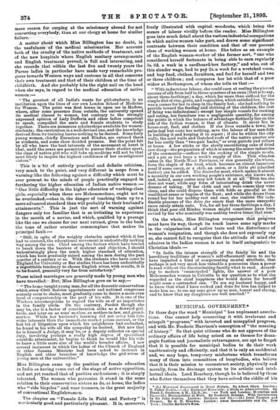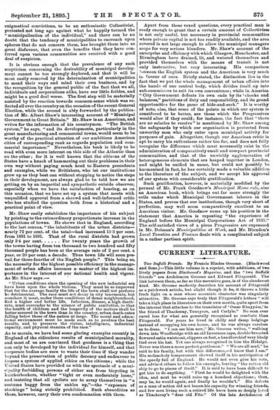MUNICIPAL GOVERNMENT.* IN these days the word " Municipal "
has unpleasant associa- tions. One cannot help connecting it with irrelevant and misspelt "programs," with inverted and misapplied progress, and with Mr. Frederic Harrison's conception of "the meaning of history." So that quiet citizens who do not approve of the ordinary affairs of life being seized on as themes for dema- gogic fustian and journalistic extravagance, are apt to forget that it is possible for municipal bodies to do their work unobtrusively and efficiently, and that it is only an accidental and, we may hope, temporary misfortune which transforms many of them into committees of busybodies, who believe that it is their mission to reconstruct society, physically and morally, from its drainage system to its artistic and intel- lectual ideals. Lord Rosebery, though he is believed by those who flatter themselves that they have solved the riddle of his • (L) Maincipal Government in Great Britain. By Albert Shaw. London : T. Fisher Unwm.—(2.) Municipal Borne-rule: a Study in Administration. By Frank J. Goodnow, A M., LL.B., &c. ew York and London: ki,emillan and Co.—(3 ) Municipalities at Work. By Frederick Dolman. With Introduction by Sir John Button. London: Methuen and Co.—(4.) Local Taxation and Finance. By G. H. Menden. London : Swan Bonne:n*1min and Co. New York, Charles Scribner's Sons.
enigmatical convictions, to be an enthusiastic Collectivist, protested not long ago against what he happily termed the "municipalisation of the individual," and there can be no doubt that the tendency of municipalities to encroach upon spheres that do not concern them, has brought them into so great disfavour, that even the benefits that they have con- ferred upon various communities are received with a good deal of suspicion.
It is obvious enough that the prevalence of any such scepticism concerning the desirability of municipal develop- ment cannot be too strongly deplored, and that it will be most easily removed by the determination of municipalities to mend their ways and mind their own business, and by the recognition by the general public of the fact that we all, individuals and corporations alike, have our little foibles, and might be a good deal worse. The first step will be materially
assisted by the reaction towards common-sense which was re- flected all over the country on the occasion of the recent General Election, while the second is ably forwarded by the publica- tion of Mr. Albert Shaw's interesting account of "Municipal Government in Great Britain." Mr. Shaw is an American, and writes for the information of his countrymen. "The British system," he says, "and its developments, particularly in the
great manufacturing and commercial towns, would seem to be worthy of the practical attention of our ambitious American cities of corresponding rank as regards population and com- mercial importance." Nevertheless, his book is likely to be read with even more interest on this side of the Atlantic than on the other ; for it is well known that the citizens of the States have a knack of hammering out their problems in their own way without paying mach heed to Eastern precedents and examples, while we Britishers, who let our institutions grow up as they best can without stopping to notice the steps in their development, are always glad to be told how we are getting on by an impartial and sympathetic outside observer, especially when we have the satisfaction of hearing, as on this occasion, that we have set up a system that meets with unqualified approval from a shrewd and well-informed critic who has studied the question both from a historical and a practical point of view.
Mr. Shaw easily establishes the importance of his subject by pointing to the extraordinary proportionate increase in the populations of towns. He shows that in England, according to the last census, "the inhabitants of the urban districts— nearly 72 per cent. of the total—had increased 15.3 per cent.
from 1881 to 1891. That of the rural districts had grown only 34 per cent. . . . . . For twenty years the growth of the towns having from ten thousand to two hundred and fifty
thousand people has been at the average rate of 2 per cent. a year, or 20 per cent, a decade. Thus town life will soon pre- vail for three-fourths of the English people." This being so, the necessity for the highest possible efficiency in the manage- ment of urban affairs becomes a. matter of the highest im- portance in the interest of our national health and vigour. As Mr. Shaw says ;— " Urban conditions since the opening of the new industrial era have been upon the whole vicious. They must be so improved that for the average family the life of the town shall not perforce be detrimental. The race must not decay in city tenements, but somehow it must, under these conditions of dense neighbourhood, find a higher and better life. Infection, disease, a high death- rate, must surrender to the science of public sanitation, so that the health of children and the longevity of the mature shall be better assured in the town than in the country, urban death-rates falling below those of the nation at large. The moral and educa- tional environment must be made such as to produce the best results, and to preserve the virtue, intelligence, industrial capacity, and physical stamina of the race."
As to morals, we have had some glaring examples recently in England of the ridiculous results of municipalised morality,
and most of us are convinced that goodness is a thing that can only be developed by the individual for himself, and that corporate bodies are sure to waste their time if they wander beyond the preservation of public decency and endeavour to impose a system of applied ethics on the citizens ; while the United States have provided us with the spectacle of a muni- c:pa.lity forbidding persons of either sex from bicycling in knickerbockers, whether "tight or even moderately loose," and insisting that all cyclists are to array themselves in "a costume baggy from the ankles up,"—the "exposure of stockings" being strictly prohibited. Such absurdities as these, however, carry their own condemnation with them.
Apart from these vexed questions, every practical man is ready enough to grant that a certain amount of Collectivism is not only useful, but necessary in provincial communities where private capital is not too readily available, and the area covered is not large enough to allow the municipal managers scope for very serious blunders. Mr. Shaw's account of the enterprise and efficiency with which Glasgow, Manchester, and Birmingham have drained, lit, and watered themselves and provided themselves with the means of transit is not only instructive, but very interesting. His comparison between the English system and the American is very much in favour of ours. Briefly stated, the distinction lies in the fact that we put the whole management of urban affairs into the hands of one central body, which divides itself, up into sub-committees to suit its own convenience ; while in America "City Government defeats its own ends by its checks and balances," partitions of duty and responsibility, and its grand opportunities for the game of hide-and-seek." It is worthy of note, also, that some of the points in which our system is considered to be better, are those which the Progressives would alter if they could; for instance, the fact that "there are no salaries to receive" is mentioned by Mr. Shaw among the safeguards by which our organisation is protected from unworthy men who only enter upon municipal activity for purposes of gain. Altogether, though our American critic is apt to carry his enthusiasm rather too far, and does not fully recognise the difference which must necessarily exist In the administration of comparatively small and compact provincial communities, and that of the unwieldy agglomeration of heterogeneous elements that are heaped together in London, and might be unified in name, but could not possibly be harmonised in fact, he has certainly made a valuable addition to the literature of the subject, and we accept his approval of our system with considerable gratification.
Such gratification, however, is materially modified by the perusal of Mr. Frank Goodnow's Municipal Hones rule, also an American book, which brings out far more strongly the evils under which Municipal Government labours in the States, and proves that our institutions, though very short of perfection, may well seem comparatively excellent to an American visitor. Mr. Goodnow sums up his position in the statement that America is repeating "the experience of England before the Municipal Corporations Act of 1835." The self-satisfied views of a pious Progressive are expressed in Mr. Dolman's Municipalities at Work, and Mr. Blunden's Local Taxation and Finance deals with a complicated subject in a rather partisan spirit.



































 Previous page
Previous page